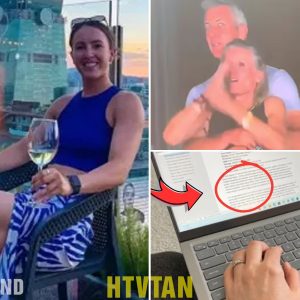“She wrote the policy. Then used it herself.” These nine words didn’t just silence a crowded conference room—they unlocked the door to an unprecedented ethical crisis inside one of America’s most influential tech corporations. But the most shocking part wasn’t what was said—it was who said it: Andrew Cabot, the husband of the woman once celebrated as the gold standard of corporate integrity.
Kristin Cabot, Chief Human Resources Officer, had just been honored at the 2025 Global AI Summit as “People Architect of the Year.” Her radiant smile, projected across massive screens before more than 55,000 attendees, embodied the triumph of modern leadership. Meanwhile, in the stands, her husband Andrew did not smile. And today, he is the one who has triggered the shockwave threatening both her company—and her legacy.

A crown and a backward mirror
With inspiring speeches and a spotless record, Kristin was hailed as the mastermind behind a progressive, AI-driven culture shift. Her frameworks for promotion and internal restructuring were praised as models of meritocracy and transparency. But according to Andrew, beneath the glowing surface was a carefully manipulated system: a power structure disguised in perfect legality.
Andrew, a former Director of Audit, had stepped down six months earlier, citing the need for “mental rest.” But in truth, he had already begun noticing irregularities: positions created seemingly out of thin air, silent promotions, and performance ratings that always favored a familiar few — her people.
Everything changed with one anonymous email. Attached was a confidential internal report, mapping job titles, pay adjustments, timelines, and promotions. The most damning detail? The metadata of the file revealed one author: K.Cabot.admin. Kristin hadn’t just benefited from the rules — she had written them specifically to benefit herself.

The truth, in nine words
Andrew never pointed a finger. He didn’t say her name. But during a closed-door ethics panel on corporate governance, he took the microphone and quietly said:
“She wrote the policy. Then used it herself.”
The room froze. The moderator tried to move on, but the silence spoke louder. A 13-second video clip began circulating on social media. Within hours, “Kristin” was trending on LinkedIn. Days later, an independent journalist published an exposé titled “The Promotion Model No One Was Supposed to See.” There were no names, but internal HR data, code logic, and software policies told the story. At the center: K.Cabot.admin.
Visionary leadership or systemic abuse?
The scandal divided public opinion. Some defended Kristin as an effective leader who mastered the system. But voices from within the company painted a darker picture:
“The algorithm praised for fairness always favored her inner circle,” said a former junior HR analyst.
Another insider leaked emails showing internal warnings about unusually concentrated top scores—warnings that were ignored.

Even one of Kristin’s old motivational messages, dated 2023, resurfaced with disturbing irony:
“Policy is culture. We define both.”
Once intended to inspire, it now reads like a veiled confession.
A marriage, a system, and an unwritten ending
Kristin has since been placed on “administrative leave” pending an external audit. Two corporate sponsors have frozen their partnerships, and the board is considering launching a fully independent investigation.
Andrew, meanwhile, has withdrawn from the public eye—shutting down his social media, moving out of their apartment. But when a reporter caught up with him and asked if he had known all along, he nodded and replied:
“I let her walk through doors others were still knocking on.”
The legacy of nine words
His phrase has become iconic. It now appears on protest signs, is quoted in shareholder meetings, debated in business schools, and trending as a hashtag.
Nine words. No names. No shouting. No apologies.
And with those nine words, Kristin Cabot’s story is no longer hers to tell.





